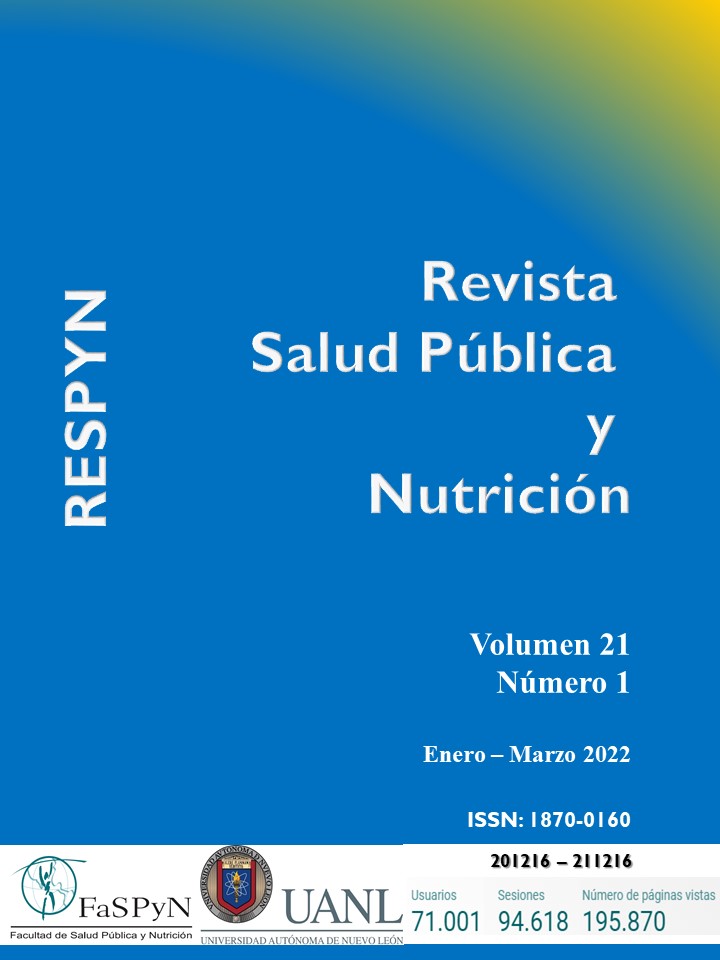Effect of omega-3 fatty acids in individuals with obesity: a systematic review.
DOI:
https://doi.org/10.29105/respyn21.1-4Keywords:
Obesidad, Ácidos grasos omega 3, suplementos dietéticosAbstract
Introduction: Obesity today is a serious public health problem at the global, national and local level, for which the role of omega-3 fatty acids in the regulation of body weight has been studied. Objective: To know the beneficial effect of omega-3 supplementation in obese humans. Material and method: A search was carried out in four online databases where the sample size was 34 to 154 participants, all participants had a BMI> 30 and <40 kg / m2 and an average adult age of 18 to 70 years. The duration of the intervention with omega-3 supplementation was 10 to 30 weeks, using a dose of 300 mg to 4 grams. Results: Supplementation with omega-3 fatty acids, for 10 to 30 weeks with a dose of 1 to 3 grams, could help improve body mass index (BMI) and waist-hip index (ICC), as well as than inflammatory modulation in IL8 adipokines and C-reactive protein. Conclusions: The evidence for the efficacy of omega-3 fatty acid supplementation for weight loss is not strong, so it is important to continue researching and reviewing its effects.
Downloads
References
Allaire, J., et al. (2017). Supplementation with high-dose docosahexaenoic acid increases the Omega-3 Index more than high-dose eicosapentaenoic acid. Prostaglandins, Leukotrienes and Essential Fatty Acids, 120, 8-14. https://doi.org/10.1016/j.plefa.2017.03.008. DOI: https://doi.org/10.1016/j.plefa.2017.03.008
Alex Buoite Stella, et al. (2018). Update on the Impact of Omega 3 Fatty Acids on Inflammation, Insulin Resistance and Sarcopenia: A Review. International Journal of Molecular Sciences, 19(1), 218. https://doi.org/10.3390/ijms19010218. DOI: https://doi.org/10.3390/ijms19010218
Castellanos T, L., & Rodriguez D, M. (2015). El efecto de omega 3 en la salud humana y consideraciones en la ingesta. Revista chilena de nutrición, 42(1), 90-95. https://doi.org/10.4067/S0717-75182015000100012. DOI: https://doi.org/10.4067/S0717-75182015000100012
DeFina, L. F., et al. (2011). Effects of omega-3 supplementation in combination with diet and exercise on weight loss and body composition. The American Journal of Clinical Nutrition, 93(2), 455-462. https://doi.org/10.3945/ajcn.110.002741. DOI: https://doi.org/10.3945/ajcn.110.002741
Du, S., Jin, J., Fang, W., & Su, Q. (2015). Does Fish Oil Have an Anti-Obesity Effect in Overweight/Obese Adults? A Meta-Analysis of Randomized Controlled Trials. PLOS ONE, 10(11), e0142652. https://doi.org/10.1371/journal.pone.0142652. DOI: https://doi.org/10.1371/journal.pone.0142652
Ellulu, M. S., Patimah, I., Khaza’ai, H., Rahmat, A., & Abed, Y. (2017). Obesity and inflammation: the linking mechanism and the complications. Archives of Medical Science, 4, 851-863. https://doi.org/10.5114/aoms.2016.58928. DOI: https://doi.org/10.5114/aoms.2016.58928
Faurot, K. R., et al. (2016). Comparison of a Medication Inventory and a Dietary Supplement Interview in Assessing Dietary Supplement Use in the Hispanic Community Health Study/Study of Latinos. Integrative Medicine Insights, 11, IMI.S25587. https://doi.org/10.4137/IMI.S25587. DOI: https://doi.org/10.4137/IMI.S25587
González-Acevedo, O., et al (2013). Efecto de la suplementación de omega 3 sobre IMC, ICC y composición corporal en mujeres obesas. (63): 224-231. http://ve.scielo.org/scielo.php?pid=S0004-06222013000300005&script=sci_abstract.
INEGI-INSP-SSA. (2020). Encuesta Nacional de Salud y Nutrición 2018. https://www.inegi.org.mx/programas/ensanut/2018/.
Izaola, O. (2015). INFLAMACIÓN Y OBESIDAD (LIPOINFLAMACIÓN). NUTRICION HOSPITALARIA, 6, 2352-2358. https://doi.org/10.3305/nh.2015.31.6.8829.
Keshavarz, S. A., et al. (2018). Omega-3 supplementation effects on body weight and depression among dieter women with co-morbidity of depression and obesity compared with the placebo: A randomized clinical trial. Clinical Nutrition ESPEN, 25, 37-43. https://doi.org/10.1016/j.clnesp.2018.03.001. DOI: https://doi.org/10.1016/j.clnesp.2018.03.001
Kiecolt-Glaser, J. K., et al. (2012). Omega-3 supplementation lowers inflammation in healthy middle-aged and older adults: A randomized controlled trial. Brain, Behavior, and Immunity, 26(6), 988-995. https://doi.org/10.1016/j.bbi.2012.05.011. DOI: https://doi.org/10.1016/j.bbi.2012.05.011
Manuel Moreno, G. (2012). Definición y clasificación de la obesidad. Revista Médica Clínica Las Condes, 23(2), 124-128. https://doi.org/10.1016/S0716-8640(12)70288-2. DOI: https://doi.org/10.1016/S0716-8640(12)70288-2
Mark H. Beers M.D, et al. (2011). (2011) Obesity & the Metabolic Syndrome. The Merck Manual of Diagnosis and Therapy- 19th Ed (pp 108-119).
Mechanick, J. I., et al. (2017). Adiposity-Based Chronic Disease as a new Diagnostic Term: The American Association of Clinical Endocrinologists and American College of Endocrinology Position Statement. Endocrine Practice, 23(3), 372-378. https://doi.org/10.4158/EP161688.PS. DOI: https://doi.org/10.4158/EP161688.PS
Munro, I. A., & Garg, M. L. (2013). Dietary supplementation with long chain omega-3 polyunsaturated fatty acids and weight loss in obese adults. Obesity Research & Clinical Practice, 7(3), e173-e181. https://doi.org/10.1016/j.orcp.2011.11.001. DOI: https://doi.org/10.1016/j.orcp.2011.11.001
Saini, R. K., & Keum, Y. (2018). Omega-3 and omega-6 polyunsaturated fatty acids: Dietary sources, metabolism, and significance — A review. Life Sciences, 203, 255-267. https://doi.org/10.1016/j.lfs.2018.04.049. DOI: https://doi.org/10.1016/j.lfs.2018.04.049
Suárez Carmona, W., Sánchez Oliver, A., & González Jurado, J. (2017). Obesidad en México: recomendaciones para una política de Estado. Fisiopatología de la obesidad: Perspectiva actual. Revista chilena de nutrición, 44(3), 226-233. https://doi.org/10.4067/S0717-75182017000300226. DOI: https://doi.org/10.4067/S0717-75182017000300226
Spencer, M., et al. (2013). Omega-3 Fatty Acids Reduce Adipose Tissue Macrophages in Human Subjects With Insulin Resistance. Diabetes, 62(5), 1709-1717. https://doi.org/10.2337/db12-1042. DOI: https://doi.org/10.2337/db12-1042
Vors, C., et al. (2017). Inflammatory gene expression in whole blood cells after EPA vs. DHA supplementation: Results from the ComparED study. Atherosclerosis, 257, 116-122. https://doi.org/10.1016/j.atherosclerosis.2017.01.025. DOI: https://doi.org/10.1016/j.atherosclerosis.2017.01.025
Downloads
Published
How to Cite
Issue
Section
License
Copyright (c) 2021 Edna Judith Nava González, Miguel Eduardo Longoria-Oyervidez , Karina Lizbeth Treviño-Casanova, María Alejandra Sánchez-Peña , Sofía Cuellar- Robles

This work is licensed under a Creative Commons Attribution 4.0 International License.
The rights of the work belong to the author or authors, however, by sending it for publication in the Public Health and Nutrition Magazine of the Faculty of Public Health and Nutrition of the Autonomous University of Nuevo León, they grant the right for its first publication in between electronic, and possibly, in print to the Public Health and Nutrition Magazine. The license used is the Creative Commons attribution, which allows third parties to use what is published whenever the authorship of the work is mentioned and the first publication that is in the Public Health and Nutrition Magazine. Likewise, the author or authors will take into account that it will not be allowed to send the publication to any other journal, regardless of the format. The authors will be able to make other independent and additional contractual agreements for the non-exclusive distribution of the version of the article published in the Public Health and Nutrition Magazine (e.g., institutional repository or publication in a book) provided they clearly state that The work was published for the first time in the Public Health Magazine, Magazine of the Faculty of Public Health and Nutrition of the Autonomous University of Nuevo León.














